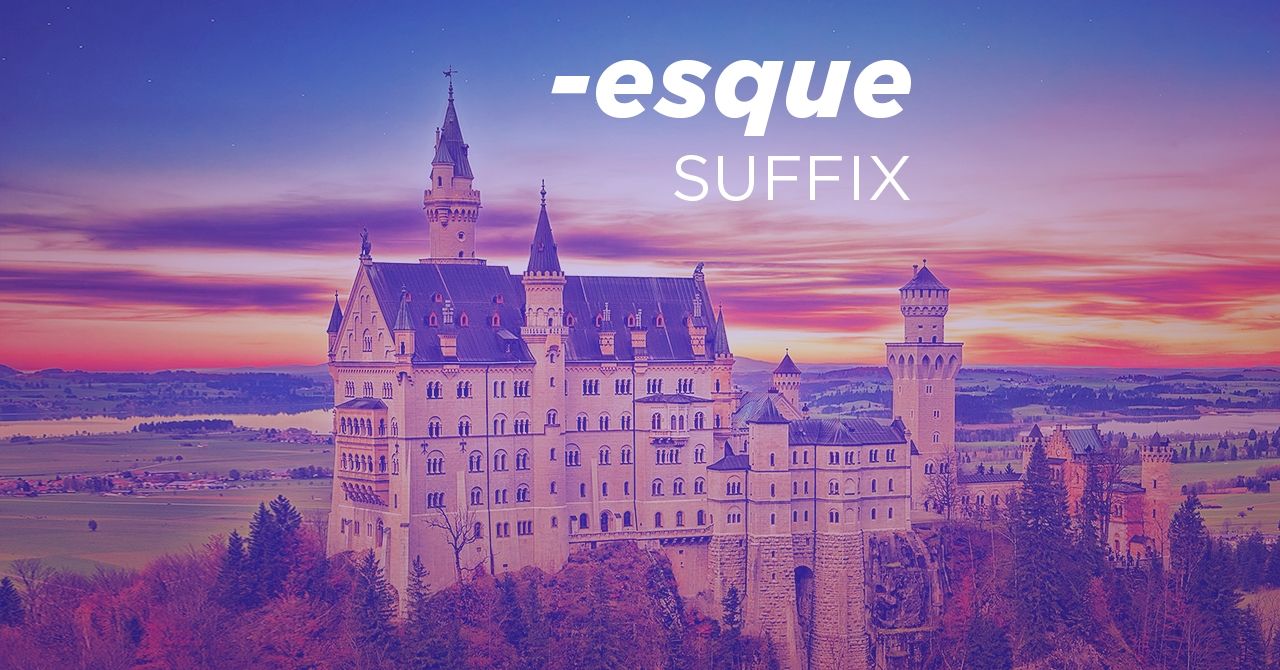
The Suffix -Esque in the English Language: Meaning, Rules, and Examples
Words ending with -esque often sound foreign and exotic. That’s because they mostly are foreign.
Words ending with -esque often sound foreign and exotic. That’s because they are mostly foreign. The suffix -esque came to English from French (and was derived from Italian –esco). Words like arabesque, grotesque, or burlesque have a distinct meanings in art history, and the English-speaking cultural elite embraced them ages ago.
Adjectives such as Kafkaesque or picturesque refer to a distinct style, manner, or resemblance. While some words with this ending have been around for a couple of centuries, it is possible to attach the suffix to virtually any noun to form an adjective that denotes similarity.
What does the -esque suffix mean?
The meaning is similar to the suffix -like in English, but not completely.
-Esque at the end of a word means “in the style of,” “in the manner of,” or “similar to.” If it’s attached to the name of a public figure (for example, Kafkaesque or Sinatraesque), it refers to a distinct style in writing or appearance.
For example, if we say that something is Kafkaesque, it doesn’t mean that it looks like Franz Kafka or anyone who shares his last name. We rather think of the kind of world that’s presented in Kafka’s written work – a specific atmosphere involving bureaucracy, hopelessness, loneliness, and absurdity. So, Kafkaesque is something that reminds us of the world of Kafka’s novels.
Examples of -esque at the end of a word
Words ending with –esque are usually adjectives. We’ve already mentioned some, so let’s see what they mean.
Romanesque — originally the name for an architectural movement inspired by Roman art, this word can be used as an adjective, meaning glamorous, romantic, or fantastic.
Statuesque — means “like a statue” in an affirmative way: dignified, noble, striking, majestic, well-proportioned, or impressive.
Lionesque — means lionlike and, just like the previous example, refers to a particular way of being like a lion: courageous, dominant, superior, and significant.
Marvelesque or Marvel-esque — this is a newly coined word and you probably already have an idea of what it means: a specific type of fantasy realm that we see in Marvel’s comics and movies.
This article can help you understand this topic; however, if you want to know more, we invite you to practice with an online language tutor on LiveXP.
Grotesque and burlesque – words ending with -esque meaning something else
There are also plenty of words, such as grotesque, arabesque, and burlesque, which end with –esque but are not about resemblance at all – and some of them are not even adjectives.
Burlesque is a noun and a verb. As a noun, it refers to a kind of parody, mockery, or joke in a literary work or in the theater. As a verb, it means to ridicule, to make a joke out of something. Burlesque has been an English literary genre since the Victorian era.
Grotesque originally referred to a kind of art and architecture that is fantastically ugly, unnatural in shape, or bizarre. Over time, the word became an adjective for something hideous, visually unpleasant, strange, or disgusting.
Arabesque used to mean “in the Arabic style.” Today, it is the name for one type of ornamental design, a posture in ballet, and a sort of ornamental melody in a musical composition.
How to use -esque?
You’ll see lots of examples of –esque words with hyphens, and most spellcheckers will prompt you to use a hyphen, but that’s not necessary. Older words, such as those in our examples, should be written without a hyphen. But if you’re about to make a new one, your spellchecker will not recognize it (which will not be a surprise), and it would suggest using a hyphen. The truth is – either way is fine.
And finally, don’t use this suffix often. Words with -esque tend to draw lots of attention. Use them only when you want to particularly highlight a specific type of resemblance.
Some examples for you:
Hello! My name is Valentina. Book digesting is my specialty. I transform book ideas into easy-to-follow summaries, articles, study guides, reviews, essays, analyses, slides, or e-books.

